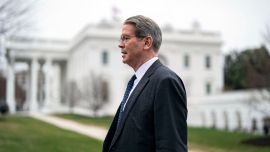President Alberto Fernández pledged to disobey a Supreme Court order to return funding to the government of the opposition-controlled city of Buenos Aires, sparking an institutional crisis and capping off a week of political setbacks.
Fernández on Thursday night called the ruling “unprecedented, incongruent and impossible to comply with,” and said he would seek to recuse all four judges of the Supreme Court from the case, according to a government statement.
“We’re before a Supreme Court that’s lost the criteria of justice,” Fernández, who is a professor of penal law at the University of Buenos Aires, said at a separate interview with a local TV channel. “It’s definitively acting on political criteria.”
The case stems from a lawsuit Buenos Aires City Mayor Horacio Rodríguez Larreta filed against the national government in 2020 after Fernández took federal funds intended to the city and gave them to Buenos Aires Province, which is governed by the president’s coalition. At the time, Fernández took the decision on the grounds that the city is much wealthier than the province.
The court ruled Wednesday that some of the money must be returned to the city, although not as much as Rodríguez Larreta was seeking. Still, it marked a political victory for the city mayor, who is seen as a top contender for next year’s presidential election, and another setback for Fernández as his ruling Frente de Todoscoalition faces growing infighting.
The president’s decision not to honour the court ruling drew immediate backlash from opposition leaders and constitutional experts, who warned the rule of law is at stake if the government ignores the court. RodríguezLarreta said the actions “broke the constitutional order.”
“Rulings aren’t debated, they’re complied with,” former president Mauricio Macri tweeted. “Disobeying a Supreme Court ruling would destroy the nation’s legal continuity and expose us to anarchy.”
Political analysts says the president’s action opened up dangerous legal precedents.
If the government continues to disobey the order, “we’ll be able to affirm, without risk of exaggerating, that the rule of law will be dead in Argentina,” says Lucas Romero, head of Buenos Aires-based Synopsis Consultores.
World Cup evacuation
The criticism heaped on Fernández’s response to the Supreme Court follows a week of setbacks for the president entering the last year of his mandate with a fraying coalition and dwindling popularity.
Argentina won the World Cup Sunday, catapulting the nation into joy and celebration. But the team’s victory parade was cut short Tuesday as fans overwhelmed security and swarmed the bus, sparking a blame game between the government and football officials over planning. Lionel Messi and other players had to be evacuated by helicopter and chose not to go to the presidential palace for the photo-op with Fernández, a tradition for most World Cup winners.
Argentina’s economy also showed signs of slowdown this week. The government reported this week that economic activity dropped for a second straight month in October while unemployment rose in the third quarter. Annual inflation is on pace to hit 100 percent in the coming months too.
related news
by Patrick Gillespie, Bloomberg























Comments